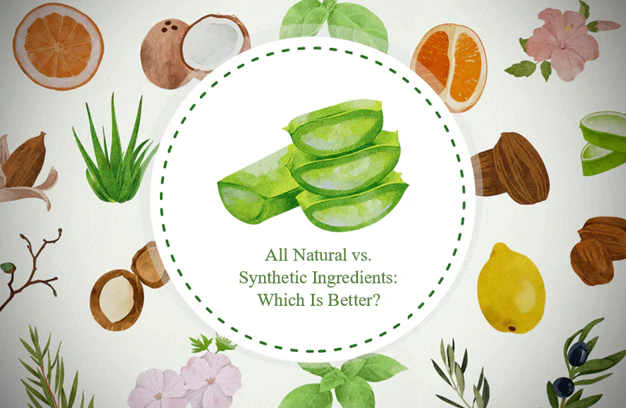In the world of skincare, the debate between natural and synthetic ingredients is a hot topic. As consumers become more conscious about what they put on their skin, understanding the differences and benefits of these ingredients is crucial. So, what's truly better for your skin—natural or synthetic ingredients? Let's dive in.
Understanding Natural Ingredients
What Are Natural Ingredients?
Natural ingredients are derived from plants, minerals, and other natural sources. They are minimally processed and are often touted for their purity and gentleness on the skin. Common examples include aloe vera, chamomile, and essential oils.
Benefits of Natural Ingredients
- Gentleness: Natural ingredients are generally gentler on the skin, making them suitable for sensitive skin types.
- Fewer Chemicals: They are free from synthetic chemicals and artificial fragrances, reducing the risk of skin irritation.
- Nutrient-Rich: Packed with vitamins, minerals, and antioxidants, natural ingredients can nourish and rejuvenate the skin.
- Eco-Friendly: Natural ingredients are often biodegradable and sourced sustainably, making them an environmentally friendly choice.
Potential Drawbacks
- Allergies: Some natural ingredients, like certain essential oils, can cause allergic reactions.
- Shorter Shelf Life: Without synthetic preservatives, natural products may have a shorter shelf life and require more careful storage.
Understanding Synthetic Ingredients
What Are Synthetic Ingredients?
Synthetic ingredients are created in laboratories and are designed to mimic natural substances or provide enhanced benefits. Common synthetic ingredients include hyaluronic acid, retinol, and various peptides.
Benefits of Synthetic Ingredients
- Consistency and Stability: Synthetic ingredients are engineered for consistency and stability, ensuring that each product delivers the same results.
- Longer Shelf Life: They often include preservatives that extend the shelf life of the product, making them more convenient for long-term use.
- Targeted Action: Synthetic ingredients can be designed to target specific skin concerns, such as wrinkles, acne, or hyperpigmentation.
- Less Risk of Contamination: Laboratory creation reduces the risk of contamination by bacteria or other impurities.
Potential Drawbacks
- Skin Irritation: Some synthetic ingredients, like certain preservatives and fragrances, can cause skin irritation or allergic reactions.
- Environmental Impact: The production and disposal of synthetic ingredients can have a negative impact on the environment.
Natural vs. Synthetic: Which Is Better?
The choice between natural and synthetic ingredients depends on individual skin types, concerns, and personal preferences.
For Sensitive Skin
Natural ingredients are often the go-to for sensitive skin due to their gentle nature and minimal processing. However, it's essential to patch-test natural products to avoid any potential allergic reactions.
For Targeted Treatments
If you’re looking for targeted treatments, such as anti-aging or acne solutions, synthetic ingredients may be more effective. Ingredients like retinol and salicylic acid have been extensively researched and proven to address specific skin issues effectively.
For Eco-Conscious Consumers
For those who prioritize eco-friendliness, natural ingredients might be the preferred choice. Many natural skincare brands focus on sustainable sourcing and biodegradable packaging.
For Budget and Convenience
Synthetic ingredients can offer budget-friendly and long-lasting options. Their extended shelf life and stable formulations make them a convenient choice for many consumers.
Ultimately, there is no one-size-fits-all answer to the natural vs. synthetic debate. Both types of ingredients have their unique benefits and drawbacks. The key is to understand your skin's needs and choose products that align with your skincare goals and values. Whether you opt for natural, synthetic, or a combination of both, informed choices will lead to healthier, happier skin.









